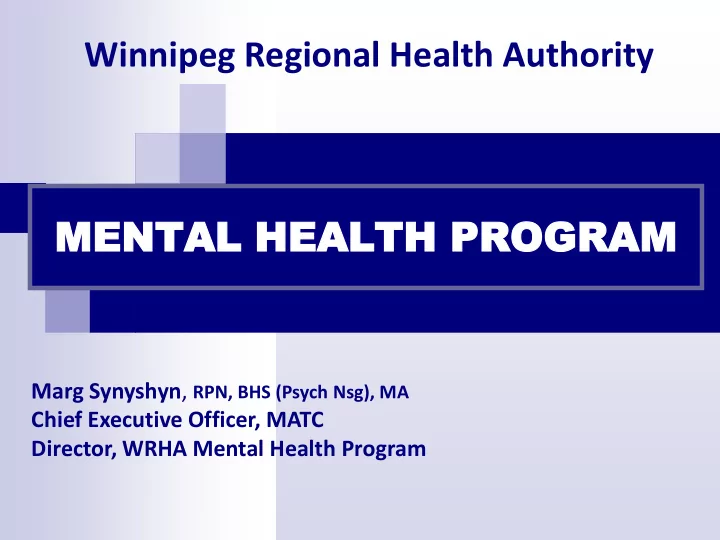

Winnipeg Regional Health Authority ME MENTAL NTAL HEALTH HEALTH PROGRAM PROGRAM Marg Synyshyn , RPN, BHS (Psych Nsg), MA Chief Executive Officer, MATC Director, WRHA Mental Health Program
DEFINING & DIFFERENTIATING 1. Mental Distress 2. Mental Health Problems 3. Mental Disorder
DEFINING & DIFFERENTIATING MENTAL DISTRESS - Very common - We all experience it - Usually not prolonged - Does not substantively and consistently interfere with usual daily life - Use usual interventions that aid adaptation - Not an illness – does not need to be treated
DEFINING & DIFFERENTIATING MENTAL HEALTH PROBLEMS Signal that adaptation is failing - Can lead to significant/substantial difficulties in everyday - life i.e. prolonged grief reaction, acute stress reaction to - trauma Counseling helpful – evidence-based interventions i.e. - CBT Medication rarely or for short periods - Well-enhancing activities – yoga, exercise - Not a gateway to mental illness -
DEFINING & DIFFERENTIATING MENTAL DISORDER - Meets internationally recognized medical diagnostic criteria (DSM/ICD) - Characterized by syndrome identification - Always associated with substantial and prolonged impairment of functioning in most areas of life - May or may not have experienced a stressful life event prior to onset
DEFINING & DIFFERENTIATING MENTAL DISORDER (cont’d) - The disorder itself leads to negative life events that accelerate the onset of symptoms - Requires treatment – best evidence-based psychological interventions (CBT for depression) and sometimes medication (SSRI’s anti -psychotics) These states do not exist in a continuum or spectrum; people do not commonly pass from one state into the other.
THE INTER-RELATIONSHIP OF MENTAL HEALTH STATES Mental Disorder/Illness Mental Health Problem KUTCHER (2012) Mental Distress No Distress, Problem or Disorder
WINNIPEG REGIONAL HEALTH AUTHORITY WINNIPEG REGIONAL HEALTH AUTHORITY CHILD AND ADOLESCENT MENTAL HEALTH SERVICES MANITOBA HEALTH ADOLESCENT SCIENCES TREATMENT CENTRE CENTRE (HSC) (MATC)
CENT CENTRALIZE RALIZED D INT INTAKE AKE (CI) (CI) Ph: 204-958-9660
CENTRALIZED INTAKE WHO ARE THESE SERVICES FOR? Children and adolescents (age 3 years up to 18 years) experiencing emotional or behavioral concerns, as well as symptoms of mental illness who live in the Winnipeg region. Parents, families or caregivers seeking consultation and support services.
CENTRALIZED INTAKE Who Can Refer to Centralized Intake? • Parents, caregivers, doctors and/or counselors can make referrals. • Self-referrals can also be made. • Centralized Intake always contacts the legal guardian when the client is under 16 years.
YOUTH AD OUTH ADDICTIONS DICTIONS CENTRALIZE CENTRALIZED INT D INTAKE AKE (Y (YACI) CI) 1-877-710-3999
ROLE OF YOUTH ADDICTIONS CENTRALIZED INTAKE (YACI) • To provide a single entry point for families or community agencies across the province to call for information on youth addiction resources • To assist families in accessing appropriate community or residential addiction services or where appropriate, re-direct to other appropriate resources
ROLE OF YOUTH ADDICTIONS CENTRALIZED INTAKE (YACI) (Cont’d) • To assist parents/guardians in determining appropriateness of applying for an apprehension order under the Youth Drug Stabilization (Support for Parents) Act • To assist parents/guardians in completing the application for apprehension
Winnipeg Regional Health Authority Child & Adolescent Mental Health Service Marg Synyshyn , RPN, BHS (Psych Nsg.) MA MATC, Chief Executive Officer WRHA, Director, Mental Health Program
Recommend
More recommend